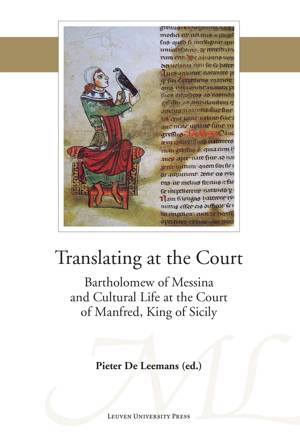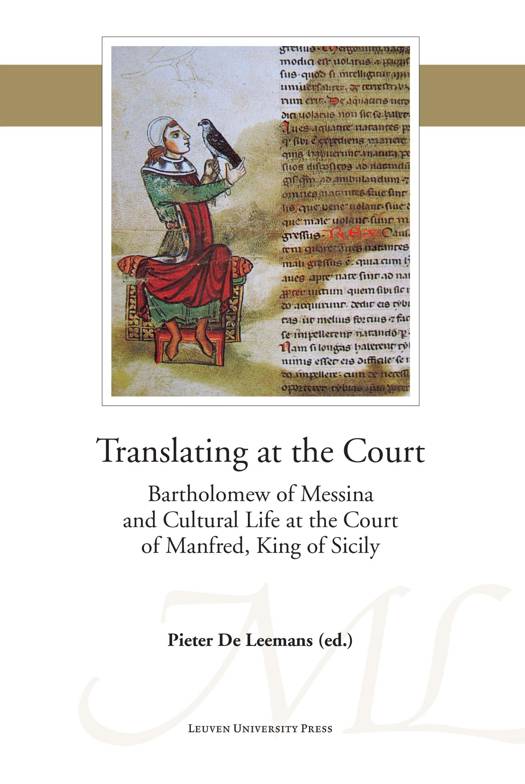
- Afhalen na 1 uur in een winkel met voorraad
- Gratis thuislevering in België vanaf € 30
- Ruim aanbod met 7 miljoen producten
- Afhalen na 1 uur in een winkel met voorraad
- Gratis thuislevering in België vanaf € 30
- Ruim aanbod met 7 miljoen producten
Zoeken
Translating at the court E-BOOK
Bartholomew of Messina and cultural life at the court of Manfred, King of Sicily
€ 44,00
+ 44 punten
Omschrijving
The importance of Bartholomew’s oeuvre and cultural life under the reign of Manfred.
The importance of Bartholomew's oeuvre and cultural life under the reign of Manfred.
An important chapter in the rediscovery of Aristotle in the Middle Ages is the oeuvre of Bartholomew of Messina (Bartholomaeus de Messana), a translator at the court of Manfred, King of Sicily (1258-1266). However, the impact of both Bartholomew and Manfred on the cultural and intellectual life of their time remains understudied, especially in comparison to the attention received by the translator's contemporary, William of Moerbeke, and by the King's father, Frederick II of Hohenstaufen. This volume contributes to the exploration of this field of research in a twofold way. It discusses the nature and importance of Bartholomew's oeuvre (and especially his translations of Aristotle). Moreover, by situating Bartholomew's activity in a broader context Translating at the Court pays special attention to cultural life under the reign of Manfred.
Contributors:
Pieter Beullens (KU Leuven), Charles Burnett (Warburg Institute, London), Valérie Cordonier (CNRS - KU Leuven), Pieter De Leemans (KU Leuven), Fulvio Delle Donne (Università della Basilicata), Elisabeth Dévière (KU Leuven), Michael Dunne (National University of Ireland, Maynooth), Dimitri Gutas (Yale University), †Kotzia Paraskevi (Aristotle University,Thessaloniki), Alessandra Perriccioli Saggese (Seconda Università di Napoli), Giacinta Spinosa (Università di Cassino), Gudrun Vuillemin-Diem (Thomas-Institut, Köln), Steven J. Williams (New Mexico Highlands University), Mauro Zonta (Sapienza Università di Roma)
The importance of Bartholomew's oeuvre and cultural life under the reign of Manfred.
An important chapter in the rediscovery of Aristotle in the Middle Ages is the oeuvre of Bartholomew of Messina (Bartholomaeus de Messana), a translator at the court of Manfred, King of Sicily (1258-1266). However, the impact of both Bartholomew and Manfred on the cultural and intellectual life of their time remains understudied, especially in comparison to the attention received by the translator's contemporary, William of Moerbeke, and by the King's father, Frederick II of Hohenstaufen. This volume contributes to the exploration of this field of research in a twofold way. It discusses the nature and importance of Bartholomew's oeuvre (and especially his translations of Aristotle). Moreover, by situating Bartholomew's activity in a broader context Translating at the Court pays special attention to cultural life under the reign of Manfred.
Contributors:
Pieter Beullens (KU Leuven), Charles Burnett (Warburg Institute, London), Valérie Cordonier (CNRS - KU Leuven), Pieter De Leemans (KU Leuven), Fulvio Delle Donne (Università della Basilicata), Elisabeth Dévière (KU Leuven), Michael Dunne (National University of Ireland, Maynooth), Dimitri Gutas (Yale University), †Kotzia Paraskevi (Aristotle University,Thessaloniki), Alessandra Perriccioli Saggese (Seconda Università di Napoli), Giacinta Spinosa (Università di Cassino), Gudrun Vuillemin-Diem (Thomas-Institut, Köln), Steven J. Williams (New Mexico Highlands University), Mauro Zonta (Sapienza Università di Roma)
Specificaties
Betrokkenen
- Uitgeverij:
Inhoud
- Aantal bladzijden:
- 426
- Taal:
- Engels
- Reeks:
Eigenschappen
- Productcode (EAN):
- 9789461661654
- Verschijningsdatum:
- 9/03/2017
- Uitvoering:
- E-book
- Beveiligd met:
- Digital watermarking
- Formaat:

Alleen bij Standaard Boekhandel
+ 44 punten op je klantenkaart van Standaard Boekhandel
Beoordelingen
We publiceren alleen reviews die voldoen aan de voorwaarden voor reviews. Bekijk onze voorwaarden voor reviews.










